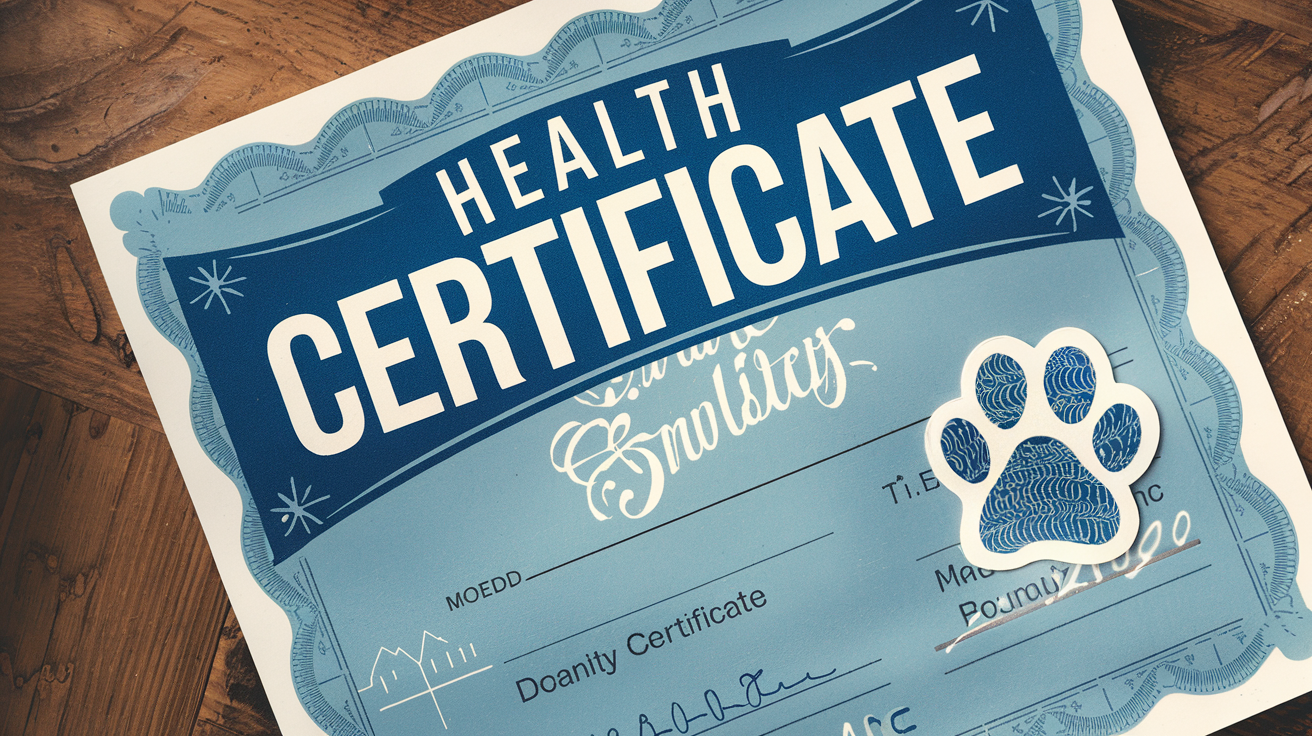Introduction To Health Certificate for Dogs
Owning a dog brings joy and companionship, but being a responsible pet owner also means ensuring your dog is healthy and fit for any activity. A health certificate for dogs is an essential document that proves your dog is in good health. It’s often required for traveling, adoption, or participating in events, especially in the UK.
In this guide, we’ll explore everything you need to know about health certificates for dogs, including why they are important, how to get one, and what’s involved in the process. By the end, you’ll feel confident about managing this responsibility.
What is a Health Certificate for Dogs?
A health certificate is an official document issued by a licensed veterinarian. It confirms that your dog is healthy, vaccinated, and free from contagious diseases. It’s often needed for activities such as:
- Traveling internationally.
- Rehoming or adopting a dog.
- Competing in dog shows or events.
- Breeding purposes.
The certificate ensures your dog is safe to interact with other animals or travel to new environments. It’s also a key part of keeping diseases under control, especially when crossing borders.
A Quick Anecdote
A dog owner named Laura planned a trip to France with her Labrador, Bailey. She didn’t realize her dog needed a health certificate until just days before departure. Luckily, her vet expedited the process, but it taught her to always plan for these requirements well in advance!
Why is a Health Certificate Important?
A health certificate for dogs is more than just a legal formality. It ensures:
- Disease Control: Prevents the spread of infectious diseases to other animals or humans.
- Legal Compliance: Many countries, airlines, and even local UK authorities require a health certificate.
- Peace of Mind: Knowing your dog is healthy allows you to enjoy your plans without worry.
For instance, if you’re traveling abroad, you’ll need to comply with specific rules set by the destination country. UK government guidelines are a great place to start for international travel with pets.
How to Get a Health Certificate for Dogs
Here’s a step-by-step guide to obtaining a health certificate in the UK:
- Book an Appointment with Your Vet:
Reach out to a licensed vet who can issue health certificates. Let them know the purpose of the certificate (e.g., travel, adoption) so they can provide the right advice. - Check Vaccinations:
Make sure your dog is up-to-date on essential vaccinations, including rabies. Some destinations might also require additional vaccines, such as for leptospirosis. - Microchip Your Dog:
A microchip is mandatory for dogs in the UK. This tiny device helps identify your dog and is often a prerequisite for the certificate. - Undergo a Physical Examination:
The vet will check your dog’s overall health, including weight, eyes, ears, and physical condition, to ensure there are no signs of illness. - Receive the Certificate:
After the examination, your vet will issue the health certificate. For international travel, this is called an Animal Health Certificate (AHC).
What Does a Dog Health Certificate Include?
A health certificate typically contains the following details:
- Owner Information: Your name, address, and contact details.
- Dog Details: Name, breed, age, gender, and microchip number.
- Vaccination Records: Proof of rabies and other vaccines.
- Vet’s Signature and Stamp: Validates the certificate.
- Specific Health Notes: Any conditions or special observations, if applicable.
When Do You Need a Health Certificate?
- Traveling Abroad:
Whether you’re heading to the EU or further afield, a health certificate is mandatory for international travel. Some countries have strict quarantine rules if this document is missing. - Dog Competitions:
To participate in events, especially those regulated by kennel clubs, a health certificate is often required. - Adoption or Rehoming:
New owners will appreciate the assurance that the dog is healthy and vaccinated.
Costs of a Health Certificate for Dogs
The cost of obtaining a health certificate varies but generally ranges from £50 to £150 in the UK. If additional tests, such as blood work, are required for international travel, the cost may increase.
Money-Saving Tip:
Some pet insurance policies cover the cost of health certificates. Check with your provider to see if this applies to your plan.
Tips for Traveling with Your Dog
- Start Early: Begin the health certificate process at least a month before your trip.
- Double-Check Rules: Different destinations have different requirements. The EU, for instance, requires an Animal Health Certificate, while non-EU countries may have unique guidelines.
- Carry Extras: Keep both physical and digital copies of the certificate to avoid hiccups.
- Keep Your Dog Comfortable: Travel can be stressful for pets. Bring familiar items like their favorite toy or blanket to keep them relaxed.
Common Questions About Health Certificates
Do I need a health certificate for domestic travel in the UK?
No, for most domestic travel within the UK, a health certificate isn’t required unless it’s for specific events or adoption purposes.
Can all vets issue health certificates?
No, only accredited veterinarians can issue health certificates. Check with your vet to confirm.
How long is a health certificate valid?
The validity depends on the purpose. For travel, most certificates are valid for 10 days. Always verify the timeline with your vet.
Conclusion
A health certificate for dogs ensures your pet is healthy and safe for travel, adoption, or participation in events. It’s not just a piece of paper—it’s a testament to your care and responsibility as a dog owner.
Don’t let unforeseen obstacles ruin your plans. Contact your vet today to begin the process of obtaining a health certificate. With proper preparation, you and your furry friend can confidently enjoy every adventure together!



